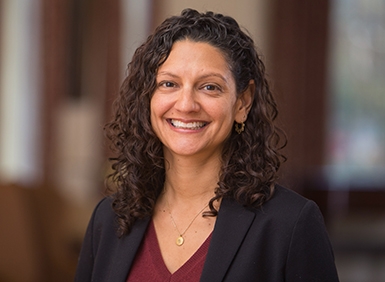Public interest jobs fair attracts largest-ever number of students and employers
In early February, the Public Interest Law Center (PILC)’s annual Public Interest Legal Career Fair marked its highest attendance ever, as 2,048 students from NYU Law and 19 other law schools met with representatives of 277 public interest employers from all over the country.
A few days before the 2020 job fair began, we talked to Assistant Dean for Public Service Lisa Hoyes ’99 and Associate Director Emily Kernan about what goes on during the fair’s two days of interviews, conversations, and networking, and how the event has helped launch the public service careers of generations of NYU Law students.
How is the PILC job fair unique?
Hoyes: It’s the largest public interest legal career fair in the country. We host the fair on behalf of a consortium of 20 area law schools, bringing around 2,000 students to our campus for the fair every year. It’s in its 43rd year, and we have some employers who have been attending for decades.
This year, we are set to have our greatest number of employers ever, about 280 organizations across 23 states and the District of Columbia, from every area of public sector work: nonprofits, government, public defender offices, civil legal service, policy work and impact litigation, and public interest law firms.
What happens at the fair? How do employers engage with students?
Hoyes: There are formal interviews, where a number of students have applied, and employers have reviewed the applications and determined which students they’d like to interview, and then the students come to the employer’s table at their appointed interview time.
Table Talk is much more informal. You don’t sign up for those conversations. Employers have information tables and students circulate. It’s an opportunity for them to learn about different areas of public interest law and practice and to network with employers.
Some employers participate in Table Talk with the goal of hiring, and we do have students every year who get an internship or job out of Table Talk.
One relatively new feature is student lunches, where employers speak to students about their organizations and practice areas and/or discuss substantive legal issues. It’s a really great opportunity for our students, because they meet employers and interact with public interest students from other schools.
How do you put it all together?
Kernan: We start planning for the next fair literally the day after the fair is over.
We have a 17-page master checklist, and we coordinate with numerous departments in the Law School and University, including hospitality, catering, communications, duplicating, IT/programming, and facilities. This year, we are also working closely with IT to design a new website for the fair that will be more user-friendly and allow for better outcomes reporting.
We also work closely with employers, students, and administrators from the 19 other law schools, providing information and updates, answering questions, and facilitating their participation in the fair.
The couple of weeks leading up to the fair is definitely the busiest time. Everyone in PILC volunteers at the fair—it is an all-hands-on-deck operation.
Hoyes: In addition, we’re also preparing our students, primarily 1Ls, to participate in this high-stress, fast-paced couple of days.
Do you see many alumni coming back to recruit?
Hoyes: Yes, they really enjoy coming to campus and meeting with students, especially when they have participated in the fair themselves. We get a lot of recent alumni coming to interview and talk to students, and that’s really nice.
Kernan: I’m preparing employer name badges for the fair right now, and it’s great to see the list of names. I know of so many of these people, and I love that they want to be here and engage with our current students.
What kinds of jobs are students particularly interested in right now?
Hoyes: A lot of students want to work in immigration, including working at the border. We have also noticed that many students are looking to leave major metropolitan areas, to go to the deep South or more rural Midwest. We’ve been trying to support that and to develop those relationships, including recruiting out-of-state employers to come to the Fair.
What happens after the fair? When do students find out if they have jobs?
Hoyes: For the most part, students hear back from employers within a couple of weeks after the fair, though some employers are now making offers on the spot: some students will get an offer at the end of the day on Thursday and accept it and then end up canceling their interviews for Friday. The PILC Fair happens toward the end of the hiring season, so we see many employers using the fair to wrap up their hiring.
Why is the PILC Fair important for NYU Law and its community?
Hoyes: It is a huge amount of work to produce this—and we are very happy to take on that role every year because we think it’s consistent with the Law School’s commitment to public service. We are celebrating and furthering public interest work by bringing together hundreds of these incredible employers and thousands of public interest students, and to have that action happening here on campus where our students can access it easily is a great benefit to the Law School. It is also critical in terms of our students securing public interest jobs; most of our first-year students get their summer internships through the PILC Fair.
Kernan: For us, it’s so fun to be there and see the energy and excitement around public interest work. I think for many students it’s an opportunity to be reminded of why they came to the Law School and to start to get really excited about what the future holds.
This interview has been edited and condensed. Posted February 26, 2020


